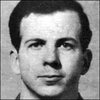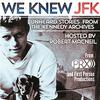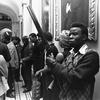Bob Garfield appears in the following:
Game Time
Friday, November 29, 2013
The typical televised football game lasts about three hours. But according to a study by The Wall Street Journal, only 11 minutes of that time is actually devoted to live play. Bob Fishman is a game director for CBS Sports, the person who decides what home viewers see and when they see it. In an interview that originally aired in 2010, Fishman explains to Bob how he spends the other two hours and 49 minutes of a broadcast.
Stats Man
Friday, November 29, 2013
If an NFL announcer sounds like an omniscient know-er of all things football, it's because they've got a stats man in the booth feeding them info. 75-year-old Marty Aronoff is one of the best stats men in the business. Bob talks with Aronoff about stats and his 200 travel days a year getting to games.
Lenny Dykstra's Downfall
Friday, November 29, 2013
Former baseball player Lenny "Dude" Dykstra has become a seemingly endless fount of stories for sports reporters who cover scandal. He's been arrested for grand theft auto and drug possession, declared bankruptcy, and been accused of bouncing a check to a prostitute. Philadelphia sports writer Frank Fitzpatrick has been covering Dykstra since before his fall from grace, and in an interview that originally aired in 2011, he talks to Bob about how sports writers can be complicit in the bad behavior of the athletes they cover.
Chilling Effects
Friday, November 22, 2013
PEN American Center, a writers’ organization, released a report last week titled “Chilling Effects: NSA Surveillance Drives US Writers to Self-Censor.” The report found that, of the writers surveyed, a sizable percentage were censoring their work, or altering their writing process, due to fear of NSA surveillance. Bob talks to LA Times Book Critic David Ulin to find out what freedom of expression really means if our thinkers are constantly looking over their shoulders.
Bach - Suite for Solo Cello No. 1 in G Major
Going Viral, Antebellum Style
Friday, November 22, 2013
The Infectious Texts project at Northeastern University is making thousands of pre-Civil War newspapers searchable. Bob talks with Ryan Cordell, a leader on the project, about the mechanism behind text virality in the 1800’s and some of what’s been discovered so far.
Black Keys - Psychotic Girl
The Journalist and the Murderer
Friday, November 22, 2013
On the same day of John F. Kennedy’s burial, a small gathering committed the remains of Lee Harvey Oswald to the ground. Apart from the immediate family, no mourners attended, leaving the task of carrying the coffin to a few assembled strangers: the reporters covering the story. Bob talks to retired Associated Press reporter Mike Cochran who was one of Oswald’s pallbearers.
Lúnasa - Black River
Correcting the Record
Friday, November 15, 2013
This week saw a couple of attempts at explaining journalistic mistakes. The first was a terse apology from 60 minutes over a botched report on the Benghazi compound attack in 2012. The second was a re-examination of The New York Times decision to delay publication of an article warrantless wire tapping for over a year. Bob examines both of these stories - and how each outlet handled them.
Jim James - All is Forgiven
Hypothetical Candidates
Friday, November 15, 2013
Chris Christie. Hillary Clinton. Rand Paul. Ted Cruz. Elizabeth Warren. This week saw a sharp spike in speculation for who would be President in 2017. Bob talks with the New York Times Magazine's Mark Leibovich about the media's fascination with hypothetical primaries three years away.
Young Marble Giants - Final Day
We Knew JFK
Friday, November 15, 2013
A new radio documentary titled We Knew JFK: Unheard Stories from the Kennedy Archives airs on public radio stations across the country, timed to the 50th anniversary of John F. Kennedy's assassination. The documentary showcases anecdotes from people who worked with JFK and knew him personally. Bob speaks to Robert MacNeil, of MacNeil/Lehrer fame, the host and co-writer of the documentary, about JFK's nuanced relationship with journalists.
The Untold Story of Guns
Friday, November 15, 2013
We’ve become accustomed in the past 20 years to seeing the issue of guns in America broken down into two camps: gun control advocates — led by police chiefs and Sarah Brady — and the all-powerful National Rifle Association. In an interview that originally aired in December of last year, Bob talks to Adam Winkler, author of Gunfight: The Battle Over the Right to Bear Arms In America, who says there was a time, relatively recently, in fact, when the NRA Supported gun control legislation, and the staunchest defenders of so-called "gun rights" were on the radical left.
Emiliana Torrini - Dead Duck
JFK and Self-Absorbed Baby Boomers
Friday, November 15, 2013
Next week marks the 50th anniversary of the assassination of President John F. Kennedy, and countless books, articles, television specials and made for TV movies will no doubt commemorate the event. Bob speaks with Reason.com editor Nick Gillespie about how the media fascination with the fallen president has less to do with his impact on the country and more to do with the Baby Boomer generation's feeling of self-importance.
Guns as Free Speech?
Friday, November 15, 2013
Last weekend, a small group of women in the local chapter of Moms Demand Action for Gun Sense in America held a meeting at a restaurant in a Dallas suburb. In the parking lot outside a group of men women and children wielding assault rifles held a pro-gun demonstration, saying they were exercising their First Amendment rights. Bob speaks to Slate's Dahlia Lithwick about the rise of Open Carry demonstrations, and whether carrying a gun qualifies as free speech.
Stories for a Price
Friday, November 08, 2013
When news outlets pay for exclusive access to a story it’s called 'checkbook journalism.' The Washington Post's Paul Farhi just reported about two recent cases of NBC News doing just that. Bob speaks with Farhi about the ethical problems raised by paying for news exclusives.
The Spanish Prisoner
Friday, November 01, 2013
Over a century before the rise of the Nigerian email scam, there was the "Spanish Prisoner" Letter, a scam which bears a striking resemblance to the emails that still dupe people today. Bob talks to historian Robert Whitaker, who wrote about "Spanish Prisoner" letters in the history journal The Appendix.
Actually, You Can't "Keep It"
Friday, November 01, 2013
This week's Obamacare troubles came in the form of media challenging the oft repeated claim by the administration that if you like your health insurance policy, you can keep it. Bob talks to Washington Post writer, and author of The Fact Checker blog Glenn Kessler about why the "you can keep it" claim was so misleading, and why the media are just now getting around to correcting it.
Don't Panic
Friday, November 01, 2013
This week the 75th Anniversary of War of the Worlds passed by and the press recounted the familiar story of a nation plunged into panic by Orson Welles and the growing power of radio. Turns out, it’s much more complicated than that. Bob talks with Professor Michael Socolow, who says tales of nation-wide panic are overblown and can be traced to a nervous newspaper industry and faulty scholarship. Socolow and Jefferson Pooley wrote about War of the Worlds in Slate this week.
A New Tool to Help Shed Light on DHS
Friday, October 25, 2013
Former Congressman Lee Hamilton told Brooke that the best way to get answers from the Department of Homeland Security is for constituents to put pressure on their representatives in Congress. Now the Data News Team at WNYC has created a tool to help do just that. Bob speaks to John Keefe, WNYC's Senior Editor for Data News and Journalism Technology, about the new tool, and how listeners can use it to do their own investigative reporting.
Acid Pauli - MST
Re-evaluating a Convenient Narrative
Friday, October 25, 2013
In 2007, Halliburton employee Jamie Leigh Jones ignited a media firestorm when she went public with a horrific story about being raped by colleagues in Iraq. Six years later, one of the reporters who covered the story as it happened has written a 10,000 word corrective, saying that the Jones story was false. Bob talks to Mother Jones reporter Stephanie Mencimer about her decision to correct the narrative.
Yeah Baby, Yeah Baby, Yeah Baby
Friday, October 25, 2013
For a few years Conan O'Brien's late night talk show has been doing a segment called Media Reacts where they play a montage of news anchors reading copy -- the exact same copy -- on local news stations across the country. It's eerie. Bob talks with KWWL 7 News Director Dan Schillinger and finds out why the media reacts in unison on some stories. (Schillnger explains this Austin Powers inspired example in particular.)
Reporting Around DHS Opacity
Friday, October 25, 2013
When OTM producer Sarah Abdurrahman tried getting answers from the Department of Homeland Security for her border detainment story, she experienced first hand how opaque the behemoth federal agency can be with reporters. But her experience wasn't unique. Brooke speaks with New York Times contributor Susan Stellin and Rio Grande Valley correspondent for the Associated Press Christopher Sherman--two journalists that regularly come in contact with DHS and its various agencies--about just how difficult it can be to get information.



















